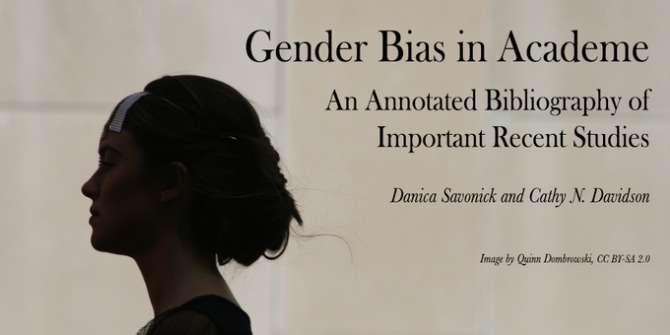
Drawing from a set of interviews conducted at Cambridge on career progression, Athene Donald discusses a collective letter calling on the entire higher education sector to reflect on how success is valued and rewarded. Across higher education, we have a process which is likely to disadvantage the typical woman, however smart and valuable she may be. Extrapolating from data accruing on the value of diversity, losing women is not likely to be good for innovation either and, so indirectly, the UK economy.
Readers will not need to be reminded that the numbers of women successfully climbing through the ranks to the top of the academic tree are small. The same is true of administrative staff: many women set out, few reach the pinnacles. In other words, just like in so many other parts of the workforce, universities are losing talent. Talent they can’t afford to lose and, one can argue, talent the UK can’t afford to lose either. HE contributes well over £3bn to the UK economy each year and set up one new company per £24 million of research funding during 2010-11. This far exceeds the record of US universities (one new company per £56 million). So, it’s a healthy sector and is generally regarded as punching above its weight. But could it do better?
In a letter published last week in the THE, we – collectively from the University of Cambridge, with over 50 signatories to the letter including me – are saying yes, we could and must do better. We need to consider much more broadly what ‘success’ means and move away from focussing so narrowly on easy-to-measure metrics which don’t capture the breadth of what we do and what we need to do. Do h indices and size of grant income sum up the totality of what an academic has to offer to their colleagues? Absolutely not. Yet too often promotion panels fixate on these metrics and ignore the wider picture.
The recent report from the Commons Science and Technology Select Committee highlighted this, remarking,
Interestingly, the skills that are normally considered essential to leadership are undervalued in academia.
Too true. So if an individual is perceived as good at teaching or pastoral care and therefore given a lot of it to do, if they invest time and energy into such matters because they feel it matters to them, then they may find they suffer when it comes to career progression. Yet these are matters vital to the health of a department and the development of students. The letter to the THE calls on the entire sector to reflect on whether the way we value success is good either for the sector or for those who choose to fill the less quantifiable but crucial roles. And it won’t have escaped the reader’s notice that these roles are filled disproportionately by women.

This letter has been prompted by a set of interviews we carried out in the university of 126 women identified by their peers as ‘successful’ , drawn from many different parts of the organisation and employed in a range of different jobs (and not simply academic ones, though that’s what I’ll concentrate on here). Many when approached were hesitant. ‘Me, why I don’t regard myself as successful‘ was a not uncommon reaction. Sifting through the initial responses to tease out the most illuminating narratives, 26 of the women were chosen for in-depth interviews. These, along with an accompanying narrative written largely by Jo Bostock, a consultant who has been working with members of the University’s Senior Gender Equality Network, assisted by the Head of our Equality and Diversity team Sigrid Fisher, will appear in a book ‘The Meaning of Success‘ which has a publication date set to coincide with International Women’s Day this month.
What came across in these intriguing and open interviews, is that what matters to the individual is not necessarily what the system rewards. I was particularly struck by the person who said she didn’t care about the publication of a paper in a high impact factor journal as much as she cared that no one felt trampled on in order to achieve it; or the person who valued empathy and communication over a dictatorial attitude. But neither points are reflected readily in promotion criteria. Cambridge does value the so-called ‘general contribution’, which might include outreach or admissions, as well as teaching. However these are factors which can be hard to evaluate but surely should be thought about when it comes to considering what makes for the good leadership on which any university will rely.
Crudely speaking those who care most about the size of their h index, the size of their grant income, the number of papers in flashy journals and the square meters of space they occupy may be characterised as alpha males (though some of them may be female and many males do not fit that description). They will have striven to achieve these big numbers, seeing it too often as the be-all and end-all. You don’t often hear a woman say – of anything – ‘mine’s bigger’. But if the woman’s isn’t bigger, whatever it might be, she may suffer when she applies for promotion. So, across the sector, we have a process which is systematically likely to disadvantage the typical woman, however smart and valuable she may be. Losing their talent is not good news for the HE sector, particularly since the unfashionable tasks – outreach, teaching and the like are crucial. It won’t be good news for the students who are seeking inspirational and supportive teachers. It certainly isn’t good news for the women. Extrapolating from the data now accruing about board rooms and teams in general and the value of diversity there, losing the women is not likely to be good for innovation either and, so indirectly, the UK economy.
We need to think much harder about our systems. Today’s letter calls for the sector as a whole to engage in this conversation.
This piece first appeared on Athene Donald’s personal blog and is reposted with permission.
Note: This article gives the views of the author, and not the position of the Impact of Social Science blog, nor of the London School of Economics. Please review our Comments Policy if you have any concerns on posting a comment below.
Athene Donald is Professor of Experimental Physics at Cavendish Laboratory at the University of Cambridge. Athene has been at Cavendish since 1983, and became a professor in 1998. Her activity sits within the sector of Biological and Soft Systems, and focusses on using the ideas of soft matter physics to study a wide range of systems of both synthetic and biological origin.








3 Comments